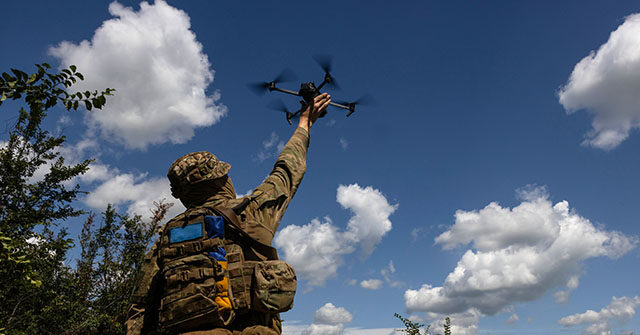China hit American drone manufacturer Skydio with sanctions this month, potentially cutting the company’s supply chain and preventing it from supplying more drones to the Ukrainian military.
“This is a clarifying moment for the drone industry. If there was ever any doubt, this action makes clear that the Chinese government will use supply chains as a weapon to advance their interests over ours,” Skydio chief executive Adam Bry said in a note to the company’s customers on Wednesday.
According to the Financial Times, Bry met with U.S. Deputy Secretary of State Kurt Campbell and senior White House officials last week to seek assistance with handling China’s sanctions. The article did not specify exactly what Bry wanted the administration to do, although one possibility would be working out a deal for Skydio to begin obtaining its batteries from Taiwanese suppliers, assuming they can handle the necessary volume.
Skydio is the largest drone manufacturer in the United States, with models designed for everything from defense and law enforcement to public safety and infrastructure management. The company’s drones operate in autonomous networks guided by artificial intelligence (AI) to cover an area quickly and efficiently.
Skydio has been an ardent supporter of Ukraine’s defensive efforts against the Russian invasion. In March, the company partnered with the U.S. Agency for International Development (USAID) to provide drones for the Office of the Prosecutor General of Ukraine (OPG) to provide drones that could investigate Russian war crimes. The drones used Skydio’s 3D Scan technology to create highly accurate models of civilian structures hit by Russian attacks.
Bry visited Ukraine in July and reported that over a hundred damaged civilian structures had been mapped by his drones, allowing Ukrainian prosecutors to study areas that would have been difficult or unsafe to reach without the unmanned aerial vehicles.
In addition to the 3D Scan system, Skydio has provided over a thousand drones to Ukraine for intelligence-gathering and reconnaissance. The company’s newest drone, the X10, is the first American-made drone to pass Ukraine’s stringent tests for resistance to electronic warfare.
China imposed sanctions against Skydio and two other U.S. companies on October 10 in retaliation for U.S. arms sales to Taiwan. Bry explained in his note to customers that the sanctions would reduce the company’s supply of batteries, a market dominated by Chinese manufacturers.
The Financial Times quoted sources who said Chinese officials personally visited some of Skydio’s battery suppliers and ordered them to stop supplying the American company.
“Batteries are one of the few components we have not yet moved out of China. We have a substantial stock of batteries on hand, and our team was already developing alternative suppliers. But right now we don’t expect new sources to come online until the spring of next year,” Bry said.
The Skydio executive mentioned the importance of the X10 drone to Ukraine, and said the company would have to ration its battery supplies to ensure X10 shipments to Ukraine are not interrupted.
“This is an attempt to eliminate the leading American drone company and deepen the world’s dependence on Chinese drone suppliers. It won’t work,” Bry said defiantly, restating his support for Taiwan as well as Ukraine.
“As we develop the supply of batteries outside of China, we will share our work with our Western peers to help the world move on from this dangerous dependency,” he said.
A U.S. official who spoke with the Financial Times seconded Bry’s accusation that China took the opportunity to use sanctions to damage Skydio because it competes with Chinese commercial drone giant DJI.
DJI filed suit against the U.S. Department of Defense (DoD) on October 18 because the company was added to a DoD list of firms working with the Chinese military. DoD advises American citizens and companies that doing business with firms designated as “Chinese military companies” could be a security risk.
DJI’s lawsuit claimed the company has “lost business deals, been stigmatized as a national security threat, and been banned from contracting with multiple federal government agencies” because of DoD’s “unlawful and misguided decision.”
DJI also complained that Customs and Border Protection (CBP) is blocking some of its drone shipments to U.S. customers under the Uyghur Forced Labor Prevention Act (UFLPA), which requires Chinese firms to prove their exports are not tainted by forced labor from the oppressed Uyghurs of Xinjiang province.
The U.S. House of Representatives passed a bill in September that would ban new DJI drones from operating in the United States, on the grounds that they present an unacceptable security risk.
Read the full article here
